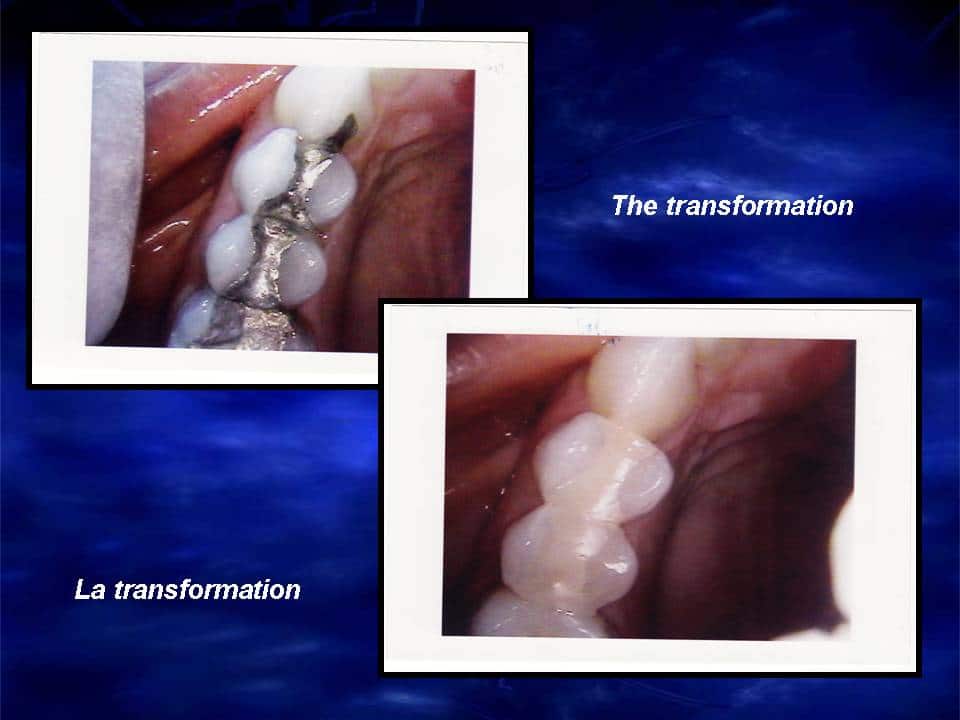What Are White Fillings?
White fillings are tooth-coloured fillings made of a mixture of resin and glass. Tooth-coloured fillings repair broken or decayed teeth. This alternative to silver fillings involves bonding techniques that result in strong margins and long-lasting structural support for you.
In the past, dental cavities were filled with a mixture of metal alloys known as amalgam. We no longer use this material for many reasons. In modern dentistry, two types of white fillings are available: Resin Restorations or Porcelain Onlays when the decay is very deep.
Which Type Of Filling Is Best For Me?
Our office offers two white filling options: resin fillings or porcelain restorations. When deciding which type of filling is best, evaluating each choice's advantages and disadvantages is necessary. Patients receive detailed information about their filling options and how they compare to help them make the most educated and confident decision for themselves.
What Are Posterior Resin Restorations?
This filling is the replacement for the old silver amalgam fillings that are in the back of your mouth. Resin restorations are bonded to the tooth to provide a seal between the tooth and restoration. Many shades are available; therefore, when you open your mouth, no one even knows you have any fillings. The technique we use for placement reduces the possibility of post-treatment sensitivity. As with all direct restorations, an alternative is needed if there is too much decay.
What Are Porcelain Onlays?
When the restoration in a posterior tooth has too much decay, porcelain onlays are the best solution. An onlay covers the functional parts (the top) of the tooth. It is as strong as a crown but much less invasive. The porcelain colour blends with the colour of your natural tooth. An onlay is a long-lasting cosmetic restoration, much like a crown.
What Are The Benefits Of White Fillings ?
Many people find white fillings an appealing option for restorative care. Understandably, fillings matched to the surrounding enamel have no effect on the smile's appearance, whereas silver fillings turn dark over time. Because of the natural appearance of white fillings, this treatment option is preferred for teeth that are visible in the smile. However, appearance is not the only advantage of tooth-coloured fillings.
With careful bonding techniques, white fillings adhere nicely to teeth. The bonding process of these fillings is much different than that of silver fillings. Because silver fillings are made with metal, they cannot bond to enamel. These fillings must be held in place mechanically, which means the dentist has to carve the tooth precisely so that the filling material will be surrounded. Mechanical retention of the silver filling requires more extensive drilling of the tooth than is necessary compared to a white filling.
Another advantage of white fillings is that the materials that are used, resin or porcelain, are not likely to corrode over time the same way metals do. Resin and porcelain also do not expand and shrink the same way that metals do. Over time, the expansion and contraction that occur with silver fillings can degrade the margins of the restoration or cause fractures in the tooth. We do not offer silver amalgam in our office for many years.
White Fillings Before & After

How Long Does Your Filling Appointment Take?
Most white fillings can be placed in a single visit unless the patient needs an inlay, onlay, or crown. Standard white fillings are placed one layer at a time, with drying in between. This approach achieves the strongest possible bond between the resin or porcelain and tooth enamel. Dr. Slepchik suggests doing one side of fillings at a time for this appointment, making it more convenient for you.
Can White Fillings Become Stained?
White fillings made with composite resin are susceptible to staining over time. Like natural enamel, resin can absorb tiny particles of consumed substances such as red wine, coffee, tea, cola, and tobacco. Superficial stains may be filed down. In more severe cases, a stained filling may be touched up with a layer of resin or replaced.
Can I Have Silver Fillings Replaced With White Fillings?
Patients whose silver fillings have eroded, fractured, or degraded in some way can have these restorations replaced with tooth-coloured fillings, onlays, or crowns. Some people choose to replace silver fillings with white fillings because they do not like the appearance of the visible filling or because they are concerned with the potential effects of mercury in silver fillings.
Are Tooth-Coloured Fillings Safe?
Tooth-colored fillings have a history of safety and efficacy. The materials used today are strong, non-allergic, and able to withstand normal biting force.
What Dr. Slepchik’s Patients Are Saying
"I have been here several times and did fillings and root canals. From reception to assistants to the doctor everyone has a friendly and professional attitude. During the treatment, both the doctor and his assistant make me feel like I am having an appointment at my home. I had no negative experience so far. I can confidently suggest this dentist to everyone."
"Dr. Slepchik is absolutely amazing. He’s the best dentist I’ve seen in my life. He’s so caring, friendly and knowledgeable. The team is just as amazing. Truly beautiful people working there. The clinic is super clean and equipped with the latest equipment and technology. You can’t go wrong going there. You will be in great hands. I highly recommend!!!"
Schedule A Consultation
To learn more about dental fillings or to schedule an appointment, contact Dr. Lenny Slepchik’s office. Call our Downtown Montreal office at 514-875-7971 or send us an email at reception@smilesbydrslepchik.com. We are located in Downtown Montreal, next to the Fairmont Queen Elizabeth Hotel across from Place Ville Marie. Metro McGill or Metro Bonaventure.
